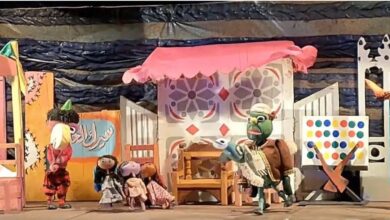Five days have passed since the opening of the Faisal Book Fair with the absence of several major publishing houses, including Madbouly, Al-Shorouk and El Ain Publishing. Only 74 out of 427 Egyptian publishers are participating in the fair
From its onset, various publishers had reservations about both the timing and location of the book fair. A common concern has been that it would fail to attract visitors as the trip from downtown Cairo to Faisal Street, Giza, can take hours during severe traffic jams – not to mention the tight opening hours of the fair during Ramadan.
“I decided to participate on the second day of the fair,” says Mohamed Hashem, owner of Merit Publishing House. "I’m not keeping my hopes high though. The residents of Faisal Street reach their homes with great difficulty due to the traffic congestion – how do we expect visitors from other areas to come? We’re still giving it a try though. Maybe a miracle will happen."
Ahmed Megahed, head of the General Egyptian Book Organization (GEBO), had hoped the fair could help publishers make up for the cancellation of the Cairo International Book Fair this year.
To the surprise of some, visitor turnout has been higher than expected during the past few days, but Hashem says sales are still low.
Hashem’s opinion resonates with that of many other publishers at the fair, particularly the 11 Arab publishing houses whose participation organizers publicized to highlight the fair as a site of cultural exchange.
Refaat Ahmed, who supervises the Saudi Al-Somaie Publishing and Distribution House pavilion, said the Faisal event was a way to sell books originally intended for the much larger international book fair.
"We had already paid the books' shipping fees to participate in the Cairo International Book Fair. When the January revolution broke out, the fair was canceled, and we returned the books to storage hoping that another date would be set. Participating in the Faisal fair seems better than spending money on storage," says Ahmed. "We have been used, however, to polish the image of the General Egyptian Book Organization, which decided to hold the event despite publishers’ objections.”
Ahmed believes the fair has had a good turnout, but attributed low sales to the activities organized in tandem with the fair.
"The majority of participants are religious publishing houses, including Al-Somaie, so why don’t organizers hold religious seminars instead of artistic performances that do not serve anybody's interests?” he says.
Ahmed also believes that most visitors are not book lovers, but residents from Faisal who come to spend time wandering around the place.
Low sales might explain the price reductions GEBO has made on its own publications, many of which are offered at the fair for only LE1.
The organization is also offering books dating back to the mid-1970s that have been kept in storehouses for years. Those include reference books, heritage books and literary publications that are sold elsewhere for prices ranging between LE30 and LE120.
This move has enraged a number of publishing houses, who say sales of their more expensive publications were affected by the cheap copies offered at the fair.
Most publications have not diverted from familiar topics, with many dealing with religion, human development, political satire and sex education.
Intellectual and literary books were nowhere to be found.
However, Mahmoud Othman's Al-Yaqeen Publishing presented a hodgepodge of content. Othman believes the turnout was higher than expected and the sales have been reasonable.
The General Egyptian Book Organization, however, could not escape Othman's criticism. He says the organization has not done well on a technical level, failing to install lighting and security gates until the fourth day. He also complained of cleanliness problems. But he believes that holding the fair in such a remote area has been a good experience for publishers.
Commenting on remarks by his neighboring participants, who said that religious publishers are the primary beneficiaries of the book fair, Othman argues, "We are not a religious publishing house. We approach culture in general. We have books on marital relationships and human development, in addition to other topics."
However, half of Al-Yaqeen's publications are interpretations of the Holy Quran and biographies of Prophet Mohamed.
One Saudi publisher has been offering his customers a bottle Zamazam water (Islamic holy water) for each book they buy.
Othman rejects the suggestion that the absence of more well-known publishers has impacted the event, arguing that people seek the books they want regardless of the publisher.
Occupying more than half of the fairgrounds, religious publishing houses stirred much debate among publishers. Those who declined to take part in the event accuse the GEBO and the Egyptian Publishers Union of favoring Salafi thought, arguing that during Ramadan, people read nothing but religious publications anyway.
"Residents of nearby areas come to the fair to have a walk and buy cheap religious books financed by Saudi publishers, who seek to promote Wahabi thought in Egypt – this is true treason," says Hashem of Merit Publishing House.
Abdel Rahman Mohamed, who runs Tanweer Publishing and Mass Media, described the decision by some publishers to boycott the event and the attack on organizers as "idiotic."
"Even if they believe that the event serves Salafi publishers alone, they should not boycott the book fair because it will give Salafis better chances of having greater presence and influence. They should have judged the event in the end," Mohamed says.
Ahmed of Al-Somaie Publishing rejects the allegations made against the fair.
"Even religious books have differences between them. Some are quite serious and deep, while others are simple, sellable publications, which are more suitable for this book fair, whose visitors never browsed anything but school books,” Ahmed says.




